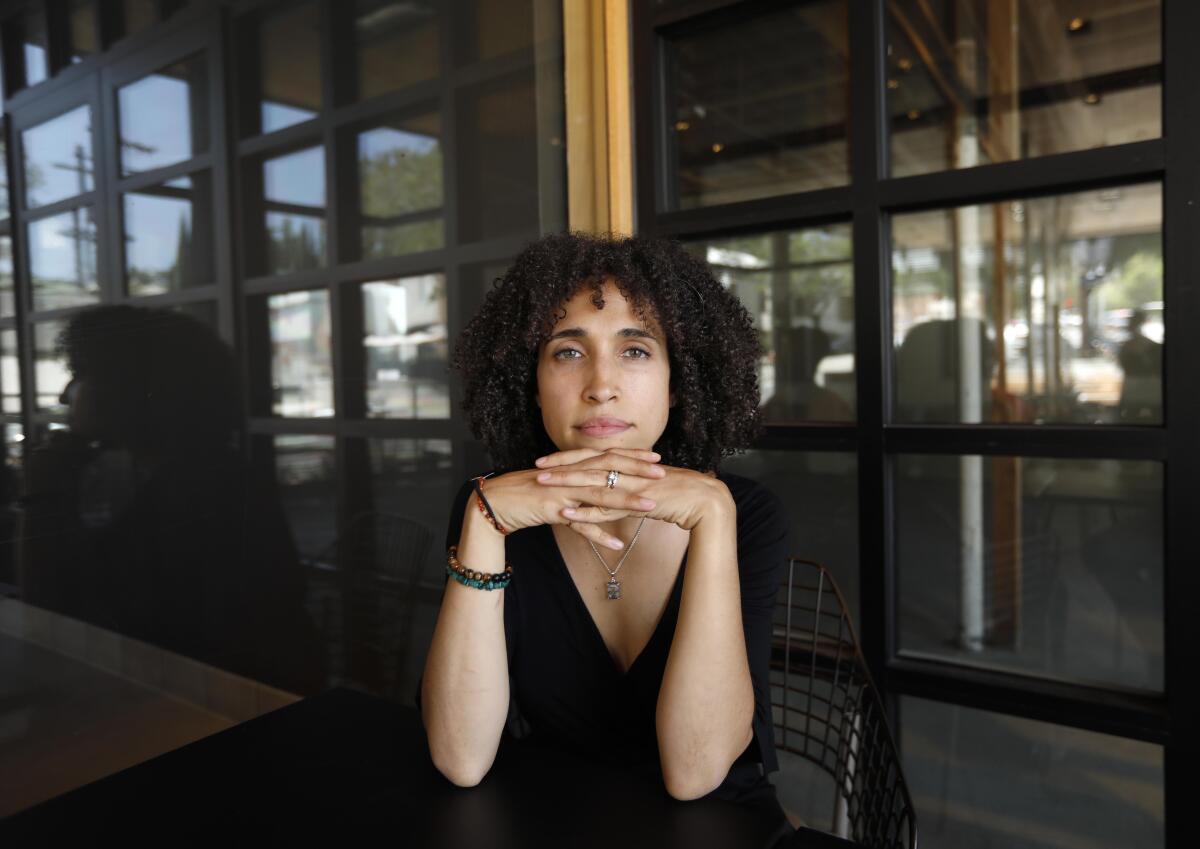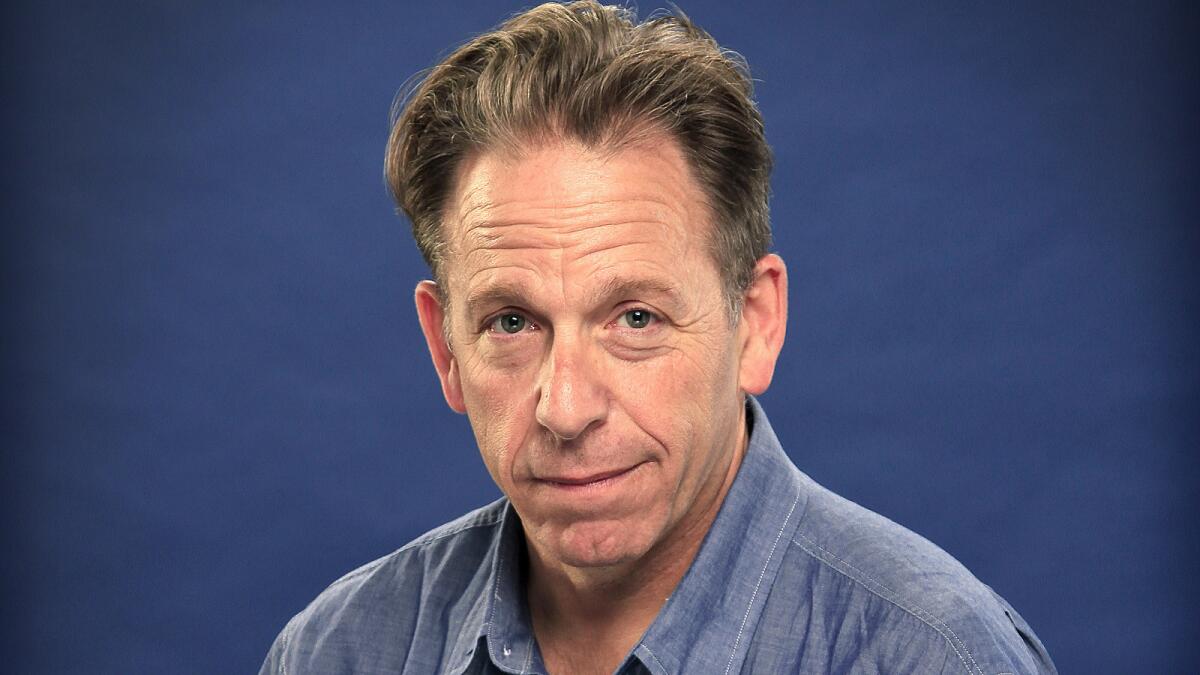The director was fired, the play never opened. Now, questions of race, power and art
Deena Selenow was to direct Antoinette Nwandu’s searing play on race in America for Echo Theater Company, but days before the opening she was fired. What happened?
- Share via
It was the type of announcement any theater, large or small, would dread sending: a notice about the cancellation of a play. But for the first time in its 23-year history, the Echo Theater Company in Atwater Village did just that.
On the day before the California premiere of Antoinette Nwandu’s “Pass Over,” a play about the harsh realities facing black men in America, Echo staff on July 12 sent an email to patrons and posted a notice on its website: “‘Pass Over’ is not going to open due to internal artistic differences that cannot be reconciled.”
The play, centered on the perspectives of Moses and Kitch, two young black men who pass their time on a dangerous street corner, is a mash-up of Samuel Beckett’s “Waiting for Godot” and the biblical Exodus saga. It also features two white characters, a police officer and an upper-middle-class man played by the same actor.
The play’s 2017 world premiere at Steppenwolf Theatre in Chicago sparked discussions about racism and free speech, partly because of a Chicago Sun-Times review which said that Nwandu’s portrayal of the white officer was “wrong-headed and self-defeating” and that much of the violence in the black community “is perpetrated within the community itself.” In 2018, “Pass Over” opened in New York’s Lincoln Center Theater, and it recently wrapped a run at A Contemporary Theatre in Seattle.
But the L.A. production — scheduled to run from July 13 to Aug. 19 — was marred by a contentious relationship between the play’s director, Deena Selenow, and Echo Theater producers. Five days before the opening, the Echo’s founding artistic director, Chris Fields, fired Selenow. In the next few days, the design team and actors resigned in solidarity. Nwandu eventually pulled licensing for the play.
At a time when theater is grappling with issues around diversity and the inclusion of marginalized voices, the optics of the Echo’s action — a white male theater leader firing a black female director and then canceling the entire production — has emerged as something of a microcosm for a national conversation about race and power dynamics in theater. Are artistic clashes inevitable as companies attempt to broaden the types of stories they present onstage and expand the roster of writers, directors, actors and other artists with whom they work? What happens when the divisions behind the scenes begin to echo the divisions onstage?
In 1965, nine Asian Americans working in theater were tired of being relegated to roles like villain or cab driver and fed up with the regular indignity of white actors playing Asian roles.
For playwright Nwandu, the cancellation of “Pass Over” was shocking.
”Firing a director the day before tech [rehearsal] — I’ve never heard of that happening,” she said. “It just seems so out of the ordinary and so extra.”
For artistic director Fields, the events leading up to the play’s cancellation were a “perfect storm.”
“It was something we’ve never done before. It was our opinion that the show was in such dire shape physically,” he said, citing problems with the play’s design and production quality.
Echo producing director Rachael Zambias said the decision was “an attempt to ensure that we present high-quality work that we owe our patrons and our mission, and to serve the play itself to the fullest.”
Days after being fired, Selenow, 36, posted a statement on Facebook. “I am a black woman directing a play written by a black woman, featuring black actors.
“I was fired, replaced by a white man, and yet my name appeared on the website and production material against my wishes until yesterday evening, once the show officially was pulled and all information was taken down from the site.”
Fields said the decision to let Selenow go wasn’t “gender-based, it wasn’t racially-based,” but something that “had to be taken care of.”

Hiring Selenow, who has more than 15 years of experience and has directed plays at the Fountain Theatre and East West Players, both respected companies in L.A.’s theater scene, was a joint decision between Nwandu and Fields.
“I asked around for recommendations and her name kept coming up,” Nwandu said. After suggesting Selenow to Fields, “it turned out he had been wanting to work with her anyway.”
But from initial design meetings to casting and through rehearsals, Selenow said Fields was unusually involved in the process of putting together the show, often sending her very detailed directorial notes. At one point, she said, she told Fields that she didn’t feel trusted.
“It felt like he was directing and I was starting to lose my vision,” she said. “I was not only trying to steer a team and see my own vision, but I was also trying to cater his.”
During a rehearsal in early July, however, Zambias said she “really started to realize that we’re in trouble.” She described issues with technical aspects of the show, including sound and lighting design and the haze machine, elements of the show’s set that weren’t approved beforehand. Zambias also cited notes that she and Fields had provided but that hadn’t been implemented.
The set’s post-apocalyptic feel and lighting design obscured the message of the script, said longtime board member and theater-film producer Randy Finch.
“I think Deena’s concept, whatever it was, was getting in the way of the play,” said Finch, who added: “This was a case where the physical production was going to ruin the play.”
The tipping point, Selenow said, came during a rehearsal about a week before opening. Fields gave her notes after one run-through, but she didn’t have enough time to implement them before the next. She planned to make final tweaks in the few days leading up to opening, but Fields “was not happy with me afterwards.”
The next day, Selenow was fired.
Fields and Zambias praised Selenow’s work with the actors and said the decision to fire her was “extremely difficult and painful.”
Fields called the situation heartbreaking: “I keep coming back, for the things that could have been done differently.”
Fields and Zambias asked company member Ahmed Best to step in as director. The play, Best said, “is about black men in the inner city, and I’m a black man from the inner city. They wanted to see what I can do just to make sure the play still went on.”
Best said he felt conflicted. He was reluctant to step into the role, but he also wanted to ensure that the young actors in the cast could perform. Untimately he didn’t have to make a decision. Nwandu pulled the licensing for “Pass Over” the same day.
Fields later offered to reinstate Selenow with a new design team, but she refused.

Some people affiliated with past productions at the theater said the firing of Selenow and the cancellation of “Pass Over” pointed to deeper issues within the organization. Last fall, the majority of the Echo’s board resigned en masse after tension with the staff over various issues, including an increase in dues and a couple members who felt Fields had been “domineering and bullying,” Finch said.
Finch described Fields as difficult at times but “one of the great men of American theater.”
“He is demanding, opinionated and passionate,” Finch added.
After learning that Selenow had been fired, actor Devere Rogers, who performed in the Echo’s 2018 production of “Gloria,” sent an email to staff asking for an explanation.
“I wanted to bring up the conversation,” he said. “As black artists, we still are not respected and seen and heard in this sort of white male privilege hierarchy that permeates the theater world.”
Other Echo members also expressed concern, Rogers said, and Fields and Zambias eventually convened a company-wide meeting. But the actor said he left feeling that the discussion didn’t accomplish much.
Selenow has been flooded with notes of encouragement from others in the theater community, but the director said she is still devastated. She added that she wondered how “Pass Over” might have played out if she were a white man.
“I don’t think [Fields] trusted me or believed in me from the beginning,” she said. “I’m confused why he hired me in the first place.”
Nwandu, who lives in New York, didn’t visit L.A. for rehearsals. She couldn’t speak about the technical or craft specifics of the show, but she was in contact with Selenow throughout rehearsals.
“We talked a lot about the meaning of the show at the very beginning,” she said. “I felt really happy with her perspective.”
Nwandu hopes the show will have another life in California. She said it’s important for artists, especially women of color, to receive “trust and the space and the resources to do the job for which she was hired.”
“Miscommunication in the arts is not uncommon,” she added. “But especially in moments of high stress and moments when everybody is a stakeholder in the situation, it’s paramount for an institution that hires people to do everything possible to rectify a situation.”
More to Read
The biggest entertainment stories
Get our big stories about Hollywood, film, television, music, arts, culture and more right in your inbox as soon as they publish.
You may occasionally receive promotional content from the Los Angeles Times.











